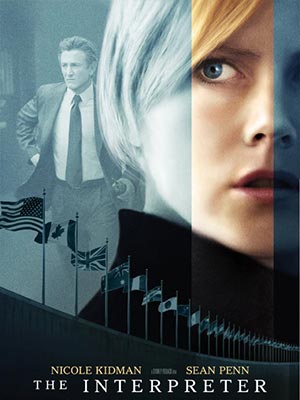 When veteran director Sydney Pollack got permission to shoot his political thriller The Interpreter in the United Nations Building, he did just position his cameras in the place, but actually took possession of it. It’s not that he got the deed or anything like that. Rather, Pollack and cinematographer Darius Khondji endowed the entryway, General Assembly hall, and warren of translator officers with the requisite emotional feelings need to transform them into dramatic settings.
When veteran director Sydney Pollack got permission to shoot his political thriller The Interpreter in the United Nations Building, he did just position his cameras in the place, but actually took possession of it. It’s not that he got the deed or anything like that. Rather, Pollack and cinematographer Darius Khondji endowed the entryway, General Assembly hall, and warren of translator officers with the requisite emotional feelings need to transform them into dramatic settings.
This is no small thing in an era when, say, movies shot in New York City by hot young directors might as well have been shot in Toronto for all the atmosphere they create. And Pollack and Khondji’s accomplishment keeps The Interpreter running when its human assets threaten to sabotage it.
For The Interpreter is saddled with one of the all-time worst performances ever given by the usually dependable Nicole Kidman. Playing the title character -- one of those U.N. multi-linguists who, among other duties, deliver simultaneous translations of delegate speeches -- the actress consistently confuses sullenness with mysteriousness and pouting with anxiety. She’s so walled off from the actors around her that Sean Penn, who plays a federal agent, has to mimic her verbal mumbling and facial freezing just to appear in tune with her. We know its Penn whose put at a disadvantage because in his scenes with his partner (played by Catherine Keener), he’s much livelier and more expressive than he is in any of his supposedly hot scenes with Kidman.
The two make for the oil-and-water pairing that “sophisticated” thrillers specialize in because one day, after the General Assembly hall has been emptied and darkened, Kidman hears unseen plotters planning an assassination. Kidman’s character, Sylvia Broome, can understand the criminal parlay because she is a white African who speaks the otherwise obscure dialect of her native country (which is fictional, but which is obviously based on Zimbabwe). The plot’s target is the country’s president, a once-heroic freedom fighter who has been turned into a ruthless dictator by years of power.
The movie defangs the improbability of Broome’s eavesdropping by having Penn’s Tobin Keller as suspicious of the story as the audience would be. He thinks the conspiracy may be even more convoluted than it appears and that Broome herself is part of it. In fact, he’s correct that Broome has a significant connection to her native land’s rebel movement, a complication that makes for plot twists that might have been enthralling, but aren’t.
For while the movie has plenty of atmosphere, it lacks dynamism. Not that Pollack can’t spin out a more-than-competent suspense set-piece. There’s a sequence of a bomber bringing an explosive device onto a city bus (shades of Hitchcock’s Sabotage!) that’s not only technically superior, but exemplary in the way it individualizes the passengers on board.
While that’s the high point of Pollack’s work, it’s not a wholly isolated example. But even the incidents that come off well don’t hang together. Perhaps the problem lies with the cornucopia of scriveners who worked on the screenplay. While Pollack is to be commended for making sure every hand receives credit, he tips his hand as to what the movie’s flaw might be: Taking one bit from writer A, another from writer B, and so on.
Even if that’s not the case, the movie feels disjointed nevertheless. And that’s ultimately due to the two stars, especially Kidman. Hiding behind a hair style that falls over half her face (and no Veronica Lake she), the actress either refuses or is unable to slowly emit those elements of character that would give The Interpreter coherence.
It’s a shame that the Pollack-Khondji collaboration goes for naught – naught at least in a general, if not occasional, sense. As he has in his past few outings, Pollack has struggle to tie together a Big Look with a Big Drama and Big Themes. Oddly for a helmsman who made his reputation as an actor’s director, Pollack keeps getting let down by his stars. But perhaps if we’re crediting him for working so well with his cinematographer, we should debit him for his vain strivings with the top of his cast.
